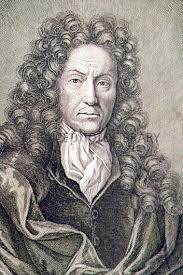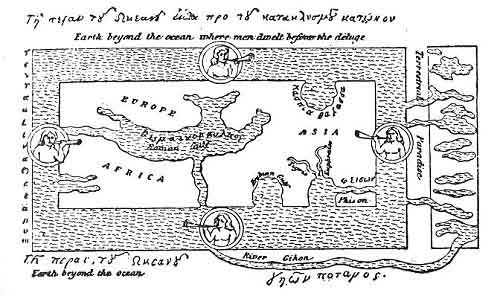Thorwal C. Franke
French Atlantology
French Atlantology can be traced back to at least the 16th century when Jean de Serres was probably the first to propose that the Holy Land was in fact Atlantis. However, even earlier, Pierre d’Ailly (1350-1420) argued that Plato’s 9,000 ‘years’ were a reference to lunar cycles, offering an implicit acceptance of the reality of Atlantis.
Whichever starting point is used it is clear from the list below that the French contribution to the study of Atlantis deserves a full volume to do it justice. Although many of those included have only made brief references to Atlantis, in fact, a few are sceptics, but collectively they offer an interesting body of work. My lack of French precluded me from offering more extensive information in most of the individual Atlantipedia entries.
A look at the indexes of Atlantipedia or Thorwald C. Franke‘s Kritische Geschichte der Meinungen und Hypothesen zu Platons Atlantis [1255] can provide a rough overview of the extent of French input to atlantology.
Pierre Lagrange published an extensive paper Les controverses sur l’Atlantide (1925-1940)(a) (The Atlantis Controversies 1925-1940) in which he reviews the Atlantis debates that raged in the early 20th century in France.
Also See: Robert Argod, Paul Aucler, Germaine Aujac, Philippe Aziz, Jean Silvain Bailly, Charles César Baudelot de Dairval, Pierre Benoit, Victor Berard , Alphonse Berget, Etienne Felix Berlioux, Jean-Louis Bernard, Jean-Marie Beuzelin, Eugene Bodichon, Alain Bombard, Jacques-Julien Bonnaud, Bory de Saint Vincent, Olivier Boura, Edouard Brasey, Brasseur de Bourbourg, Philippe Buache, Pierre Buffault, Georges-Louis Buffon, Ferreol Butavand, Jean-Marcel Cadet, Emile Mir Chaouat, Louis Charpentier, Michel-Alain Combes, Paul Couissin, Jean-Leopold Courcelle-Seneuil, Antoine Court de Geblin, Fernand Crombette, Guilleaume Delaage, Jean-Claude Delamethrie, J.B. Delisle deSales, Jean-Pierre Deloux, Jean Deruelle, Roger Devigne, Charles DeBrosses, Leopold deFolin, Leon de Rosny, Adolphe Dureau De la Malle, Henri D’Arbois de Jubanville, Marie-Armand d’Avezac, Jean d’Eraines, Antoine Fabre d’Olivet, Roger Elefant, Henri Estienne II (Stephanus), Roger Facon, Louis Guillaume Figuier, Lionel Filipoff, Jean-Albert Foex, Fortia d’Urban, Chantal Foucrier, Nicolas Freret, Paul Gaffarel, Jean Gattefosse, Rene-Maurice Gattefosse, Gautier of Metz, Louis Emile Gentil, Lucien Geradin, Louis Germain,Therese Ghembaza, Francois Gidon, Antoine Gigal, Pierre Louis Ginguene, Dominique Godron, Sylvain de Golbery, Jacques Gossart, F.P.J. Gosselin, Rene Guenon, Maurice-Erwin Guignard, Amedee Guiraud, Ernest Theodore Hamy, Jacques Hebert, Jean-Michel Hermans, Hans-Peny Hirmenech, Marcel Homet, Pierre Daniel Huet, Louis Jacolliot, Leonce Joleaud, Jean Francois Jolibois, Dominique Jongbloed, J.B. de LaBorde, Gustave Lagneau, Pierre-Andre Latreille, Louis de Launay, Jacques Lebeau, Andre-Pierre Ledru, Paul le Cour, Francois de la Mothe leVayer, Jacques de Mahieu, P.G. Mahoudeau, Rene Malaise, Michel Manzi, Jean Markale, Bernard Marque, Charles Frederic Martins, Thomas-Henri Martin, Jean Mazel, Edme Mentelle, Roger Mermet, Louis Millette, Pierre Mille, Michel de Montaigne, A-C Moreau de Jonnes, Alain Moreau, Theophile Moreux, Gabriel de Mortillet, Jean Emile Mourey, Phocion Negris, Auguste Nicaise, Jerome Nickles, Claude-Mathieu Olivier, Enrique Onffroy de Thoron, Abraham Ortelius, Andre de Paniagua, Fabien Pardo, Jean-Pierre Patznick, Eugene Pegot-Ogier, Isaac La Peyrere, Francois Placet, Georges Poisson, Guillaume Postel, G.T.F. Raynal, Onesime Reclus, Albert Rivaud, Fernand Robert, Godefroy de Roisel, Claudius Roux, Leonard Saint-Michel, Alexandre Saint-Yves d’Alveydre, Francois de Sarre, Jean Seimple, Jean de Serres, Pierre Termier, Charles Tissot, J.P. de Tournefort, Ivan Tournier, Rene Treuil, Sylvain Tristan, Gilles Robert de Vaugondy, Rene Verneau, Pierre Vidal-Naquet, Louis-Claude Vincent, Jean-Frederick de Waldeck,
(a) https://www.researchgate.net/publication/320471002_Les_controverses_sur_l%27Atlantide
Cellarius, Christoph
 Christoph Cellarius (1638-1707) was a German classics scholar and philologist, who was appointed Professor of Eloquence and History at Halle University.
Christoph Cellarius (1638-1707) was a German classics scholar and philologist, who was appointed Professor of Eloquence and History at Halle University.
>I had originally listed Cellarius as a supporter of an Atlantic Atlantis, but this appears to be incorrect according to the research of Thorwald C. Franke. In his Critical History of Opinions and Hypotheses on Plato’s Atlantis, he says: ” In the work Geographia antiqua iuxta et nova, published in Latin in 1687 and later translated into German, Cellarius expressed briefly on the question of whether America is Atlantis: he considers it uncertain. In the second volume of his work Notitia orbis antiqui sive geographica plenior , published in 1706 [1304] , Cellarius became clearer: he now considered it probable that there was a core of truth in Plato’s Atlantis story, the one on America points out, and that these obscure tidings came from America, among other things, to the Greeks via Egypt.
Contrary to the opinion of Thomas Henri Martin, Cellarius does not explicitly speak out against the existence of Atlantis. The passages given by Martin deal with the spherical shape of the earth and other things, but not with Atlantis. Manfred Petri seems to have adopted this opinion from Martin without looking at it.“(a)<
(a) Christoph Cellarius – Atlantisforschung.de (atlantisforschung-de.translate.goog) *
Cosmas Indicopleustes
Cosmas Indicopleustes was a 6th-century AD theologian and geographer from Alexandria who became a monk in later life. He wrote of Atlantis as a large island in the western ocean punished by god with submergence. He also added a twist to the tale by recording a tradition that Noah had resided in Atlantis. Cosmas was probably the first writer to use Plato’s tale as evidence for the veracity of the Bible. He contended that Atlantis was the Garden of Eden and that Plato’s 10 kings of Atlantis were the 10 generations between Adam and Noah!
His only extant book, Christian Topography, is a bizarre work that includes support for a Flat (Square) Earth. A translation[1245] by J. W. McCrindle was published by the Hakluyt Society in 1897(b).
>It seems to me that Cosmas has added little to the Atlantis story except for further confusion. However, Thorwald C. Franke has published an essay on the relevance of Cosmas Indicopleustes to Atlantis studies(c).<
One commentator described his work as a ‘monument of unconscious humour.’
Jason Colavito has traced(a) some of Graham Hancock’s theories back through Donnelly, Faber, and Bailly and even as far as Cosmas.
(a) https://www.jasoncolavito.com/blog/a-byzantine-claim-about-atlantis-and-noahs-flood
(b) https://www.sacred-texts.com/earth/ct/index.htm
(c) Kosmas Indikopleustes – Atlantisforschung.de (atlantisforschung-de.translate.goog) *

